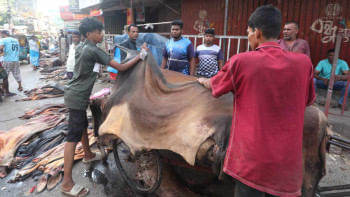In George Floyd’s hometown, a season of protest ends at the polls

Dexter Faircloth stalked the streets of Houston's Third Ward, the historic Black neighborhood where he was born and raised, shouting greetings and asking an urgent question.
"Y'all vote?! Did you?" Faircloth, 35, hollered repeatedly at people, who smiled when they recognised him as he canvassed the area last weekend.
Faircloth, a corporate trainer, says he has always been an advocate for his community. But that role became more urgent when his friend and Third Ward native, African-American George Floyd, died in May after a white Minneapolis police knelt on his neck for nearly nine minutes.
The summer's simmering anger and demands for justice that Floyd's death ignited have transformed into huge voter turnout for Black Americans in some parts of the country. That is especially true of the Third Ward, where hopes for change have energized many in the final days of the race between President Donald Trump, a Republican, and Democratic rival Joe Biden.
Early voting at the Third Ward's three polling stations is up more than 650% compared to 2016 figures, according to data from the Harris County Clerk's Office.
"Look, man. Voting is not the end-all-be-all. It's just the start," Faircloth said. "But we're telling people: 'If you want change, this is how you begin to change things.'"
The Third Ward, a patchwork of old wooden homes, bodegas and barber shops with hand-painted storefronts less than a mile from downtown Houston's skyscrapers, houses some of the city's crown jewels for African-American culture, including Texas Southern University.
Floyd, who played college football and basketball, was a mentor to neighborhood boys and encouraged them with his optimism, Faircloth recalls. Third Ward residents were enraged by the brutal manner in which Floyd died, which was captured on video by a bystander.
"Seeing that video was almost as if we were watching slaves being beaten in real life," Faircloth said. "Instead of whips, the weapons were a knee and a badge."
Third Ward residents who knew Floyd best marched daily, as Black Lives Matter protests spread across the globe. In Houston, they were joined by Police Chief Art Acevedo, who told Reuters he remembers Faircloth and other young Black leaders from the Third Ward helping maintain the peace during protests.
Floyd's death was a tragic reminder that policing is not where it should be, Acevedo said. He recalls telling Third Ward residents, and others in Houston, that there's not just one way to fix that problem. "We told people that it's really important that they not just take to the streets, but that they take to the polls during the election," he said.
"VOTING FOR GEORGE"
Voters who Reuters spoke to in the Third Ward and nearby said they emerged from this summer's protests not just more politically active, but also confident they can make their voices heard.
"It feels like we're in a new Civil Rights era," said JD Fontenot, a pharmacy student at Texas Southern University.
The world he and other young minorities are beginning to help shape feels like a mirror image of the days of Martin Luther King Jr and Malcolm X, he said, and voting is a first step.
"The fact that our vote is directly linked to Black people's freedom in America is on the minds of people right now," Fontenot said.
So is tension between Blacks and whites.
"The racial injustice we are seeing right now, which had been subliminal but now spews forth in the open, is making it clear to the Black community that we have to come out and vote," said daycare worker Veronica McClendon, 53, who was born and raised in the nearby Fifth Ward.
Faircloth and two other members of the Alpha Phi Alpha Black fraternity - Carlos Pinkerton and Sheldon Hadnot - canvassed door-to-door in the Third Ward last weekend.
When they spotted Arnetta Taylor outside her home, they wouldn't take no for an answer. Dispelling her concerns about a missing voter registration card, they explained other forms of ID she could use and got her commitment to go to the polls.
"Take my number and call me on Monday to make sure I voted! I'm 46-years-old and I've never voted in my life, but I will now," Taylor said.
She was clear about her motivation.
"We're voting for George," she said. "We're voting for Breonna Taylor, too. We're voting for a lot of Black people that have been killed in this way."

 For all latest news, follow The Daily Star's Google News channel.
For all latest news, follow The Daily Star's Google News channel. 



Comments